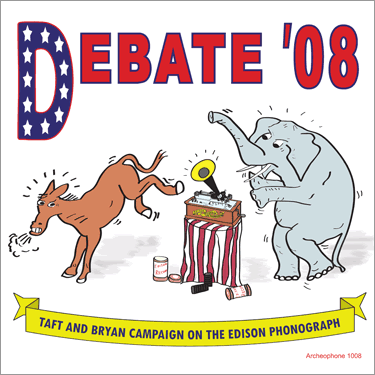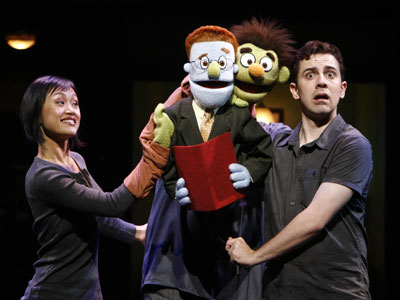Joseph Epstein, Fred Astaire (Yale, $22). The latest addition to Yale’s “Icons of America” series is a 198-page tribute to America’s greatest dancer by one of America’s best essayists. Witty, thoughtful, concentrated, and astute, Fred Astaire goes a long way toward conveying the essential quality of an intensely private man who only seems to have come fully to life in the studio. Unlike most commentators, Epstein also pays proper attention to Astaire’s singing, but most of the book is devoted to his dancing–and, no less interestingly, the persona he projected in his films and TV appearances. After Arlene Croce’s indispensable 1974 monograph on the Astaire-Rogers films, this is the Fred Astaire book to have if you’re only having two (TT).
Archives for October 2008
TT: Bowing to a higher authority
This week’s Wall Street Journal drama column–which I wrote in the living room of a Frank Lloyd Wright house in Cleveland, Ohio, thank you very much–is about two shows I saw last week on Broadway, A Man for All Seasons and 13. The first is good, the second not. Here’s an excerpt.
* * *
 In 1961, Robert Bolt’s “A Man for All Seasons” opened on Broadway and ran for a year and a half–an impressive run by any standard, and altogether astonishing for an intellectually demanding history play set in the 16th century. Now “A Man for All Seasons” is back on Broadway for the first time in 45 years. Why the long wait? Two words: the movie. Fred Zinnemann’s 1966 film version preserves Paul Scofield’s famous stage performance St. Thomas More, who got his head chopped off in 1535 for opposing the illegal divorce and remarriage of King Henry VIII and was canonized 400 years later. It’s one of the best movies ever made from a play, and it brought home six Oscars, one of them for Scofield and all well deserved. Small wonder that nobody dared to revive the play until now.
In 1961, Robert Bolt’s “A Man for All Seasons” opened on Broadway and ran for a year and a half–an impressive run by any standard, and altogether astonishing for an intellectually demanding history play set in the 16th century. Now “A Man for All Seasons” is back on Broadway for the first time in 45 years. Why the long wait? Two words: the movie. Fred Zinnemann’s 1966 film version preserves Paul Scofield’s famous stage performance St. Thomas More, who got his head chopped off in 1535 for opposing the illegal divorce and remarriage of King Henry VIII and was canonized 400 years later. It’s one of the best movies ever made from a play, and it brought home six Oscars, one of them for Scofield and all well deserved. Small wonder that nobody dared to revive the play until now.
Why, then, is the Roundabout Theatre Company bucking such long odds? Because it has an ace in the hole: Frank Langella. He hit the jackpot last year with his eerily evocative interpretation of Richard Nixon in “Frost/Nixon,” and is returning to Broadway in an equally meaty role. From disgraced president to martyred saint–how can you lose? Nor does he. Mr. Langella’s version of St. Thomas is all his own: urbane, world-weary, more public than that of his great predecessor, which makes it all the more moving when he collapses in fear and desperation midway through the second act, knowing that he may be about to lose his life over a matter of conscience. Better than Scofield? No–but just as good….
The authors of “13” have taken the cynical advice of the authors of “Gypsy”: They’ve got a gimmick. Specifically, their show, which tells the story of a young New Yorker (Graham Phillips) who moves to a small town in Indiana and can’t figure out how to fit in with the cool kids, was written for “tweens” and is performed by teenagers. Except for Tom Kitt, the conductor, everyone in the cast and in the onstage rock band that accompanies “13” is well under the age of 20.
I, alas, am a childless drama critic of an all-too-certain age, so I’m not sure that my reactions to “13” will be relevant to its target market (and I use the word “market” very advisedly). On the other hand, I’m an avid fan of teen-oriented films and TV series like “Napoleon Dynamite” and “Buffy the Vampire Slayer” in which the agonies of adolescence are portrayed with wit and detachment, so it may be worth saying that I found “13” to be banal from start to finish…
* * *
Read the whole thing here.
Here’s my wsj.com video review of A Man for All Seasons, which includes footage from the show. Don’t be fazed by the introductory commercial–it’ll be over in a flash:
TT: Campaigning with cylinders
 A couple of weeks ago Archeophone Records, a tiny but inventive label that specializes in CD reissues of sound recordings made in the early years of the twentieth century, sent me a copy of its latest release, Debate ’08: Taft and Bryan Campaign on the Edison Phonograph. It’s a collection of the twenty-two cylinder recordings that were made by William Jennings Bryan and William Howard Taft for Thomas Edison’s National Phonograph Company as part of their presidential campaigns. (You can hear snippets from the recordings by visiting Archeophone’s Web site.) I knew at once that a “Sightings” column for The Wall Street Journal had been dropped into my lap, and in tomorrow’s paper you can read the results.
A couple of weeks ago Archeophone Records, a tiny but inventive label that specializes in CD reissues of sound recordings made in the early years of the twentieth century, sent me a copy of its latest release, Debate ’08: Taft and Bryan Campaign on the Edison Phonograph. It’s a collection of the twenty-two cylinder recordings that were made by William Jennings Bryan and William Howard Taft for Thomas Edison’s National Phonograph Company as part of their presidential campaigns. (You can hear snippets from the recordings by visiting Archeophone’s Web site.) I knew at once that a “Sightings” column for The Wall Street Journal had been dropped into my lap, and in tomorrow’s paper you can read the results.
The story of these cylinders is extraordinarily interesting, and is well told in the seventy-nine-page booklet that accompanies Debate ’08. But it’s even more interesting to listen to the recordings than it is to read about them. How did two nineteenth-century politicians respond to the challenge of a brand-new medium that required them to read their speeches into a horn instead of bellowing them out in front of a large audience without benefit of amplification? To find out, pick up a copy of Saturday’s Journal and see what I have to say.
UPDATE: Read the whole thing here. You can also listen to excerpts from four recorded speeches in which Bryan and Taft discuss American imperialism and the banking crisis of 1907-08. Talk about timely!
TT: Almanac
“All live performance is a passing away of time and the body: this dying is the primer, the medium, upon which all theatrical and performative activity is imposed; in its wake nothing, mere memory that fades and dies away as well. It is at the heart of all live performance; in common with the performer the audience is passing away also, decaying, bodies experiencing the curse of time together.”
George Hunka, Superfluities Redux, Sept. 25, 2008
BOOK
David Sheward, Rage and Glory: The Volatile Life and Career of George C. Scott (Applause, $29.95). The first full-scale biography of the actor who turned down an Oscar for Patton, Rage and Glory serves as a useful reminder that there was far more to George C. Scott than his legendary temper. Detailed and decently written, it devotes as much attention to his stage career as to the films–most of them, alas, awful–for which he is now best remembered. As for the films, take a look at Anatomy of a Murder, Dr. Strangelove, The Hustler, and The Hospital if you haven’t done so lately. Along with Patton, they’re the only worthy movies that Scott made, but they’re good enough to ensure that he won’t be forgotten (TT).
CAAF: Who doesn’t?
Last week I pointed to a New Republic review of a new collection of the letters of Robert Lowell and Elizabeth Bishop. The book, Words In Air, won’t be out till the end of the month, but until then you can find a nice sampling of the letters in the October issue of Poetry (unfortunately not available online).
I’ve read much of Bishop’s side of the correspondence in One Art but it’s even more enjoyable to read her letters alongside Lowell’s own volleys and sallies. The letters are little gems, and I’m tempted to type them all in here, but in lieu of copyright larceny I’ll give you this sauntering paragraph from one of Lowell’s:
Since my last letter it has become autumnal (nice but muggy) and I’ve read Black Arrow, Weir of Hermiston, The Master of Ballantrae, and Graves’ abridgement of David Copperfield. Saw Black Arrow as a movie too — it’s a cumbersome pot-boiler at best, but redone with the plot of a western thriller it is, is — words fail me. Had a drunken discussion with two Englishmen in which I tried to use the Socratic method, but only discovered that none of us could define “right” or “good.” And finished off 23 more poets; God, how I dislike them!
CAAF: Morning coffee
• Should Margaret Drabble’s next novel feature a boy wizard with magical friends I guess we’ll all understand why. (Via Literary Saloon.)
• Not literary but five days later this skit still makes me laugh.
TT: So you want to see a show?
Here’s my list of recommended Broadway, off-Broadway, and out-of-town shows, updated weekly. In all cases, I gave these shows favorable reviews (if sometimes qualifiedly so) in The Wall Street Journal when they opened. For more information, click on the title.
Warning: Broadway shows marked with an asterisk were sold out, or nearly so, last week.
BROADWAY:
• Alfred Hitchcock’s The 39 Steps (comedy, G, suitable for bright children, reviewed here)
• August: Osage County (drama, R, adult subject matter, reviewed here)
 • Avenue Q (musical, R, adult subject matter and one show-stopping scene of puppet-on-puppet sex, reviewed here)
• Avenue Q (musical, R, adult subject matter and one show-stopping scene of puppet-on-puppet sex, reviewed here)
• Boeing-Boeing (comedy, PG-13, cartoonishly sexy, reviewed here)
• Equus (drama, R, nudity and adult subject matter, closes Feb. 8, reviewed here)
• Gypsy (musical, PG-13, adult subject matter, reviewed here)
• The Little Mermaid * (musical, G, entirely suitable for children, reviewed here)
• South Pacific * (musical, G/PG-13, some sexual content, brilliantly staged but unsuitable for viewers acutely allergic to preachiness, reviewed here)
OFF BROADWAY:
• The Fantasticks (musical, G, suitable for children capable of enjoying a love story, reviewed here)
CLOSING NEXT WEEK OFF BROADWAY:
• Enter Laughing (musical, PG-13, closes Oct. 26, reviewed here)
CLOSING NEXT WEEK IN CHICAGO
• R.U.R. (serious comedy, PG-13, adult themes, closes Oct. 25, reviewed here)
CLOSING SATURDAY IN CAPE MAY, N.J.:
• To the Ladies (comedy, G, closes Oct. 18, reviewed here)
